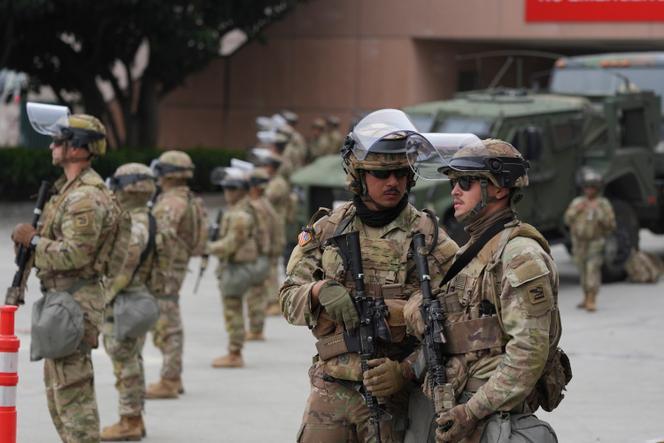Federal Court Declares Trump’s National Guard Deployment in Los Angeles Illegal
A federal court has determined that the deployment of the National Guard in Los Angeles, ordered by former President Donald Trump, was unlawful. This ruling highlights critical issues surrounding federal overreach and the failure to properly coordinate with local authorities. The judge emphasized that the deployment circumvented essential legal safeguards designed to regulate military involvement in civilian areas, underscoring the necessity of upholding state sovereignty and protecting civil liberties during periods of civil unrest.
Highlights from the court’s decision include:
- Contravention of the Posse Comitatus Act: The deployment was found illegal due to the unauthorized use of military forces in a domestic law enforcement capacity without explicit congressional approval.
- Lack of Adequate Local Engagement: City officials in Los Angeles were insufficiently consulted, resulting in operational confusion and strained relations on the ground.
- Threats to Civil Rights: The ruling raised alarms about the potential suppression of peaceful demonstrations and the misuse of military power under the pretext of maintaining order.
| Focus Area | Judicial Conclusion | Consequences |
|---|---|---|
| Federal Jurisdiction | Exceeded lawful limits | Restricts future unilateral military actions |
| State Authority | Overlooked in decision process | Reinforces state governance rights |
| Public Order | Effectiveness questioned | Calls for balanced civil-military strategies |
Legal Precedents and Constitutional Boundaries Established by the Verdict
This landmark ruling clarifies constitutional constraints on deploying federal military forces in domestic law enforcement roles. By invalidating the National Guard’s deployment in Los Angeles, the court reaffirmed that such actions must strictly adhere to statutory requirements, particularly those outlined in the Posse Comitatus Act.The judgment stresses the imperative of securing lawful authorization before employing military power within U.S. cities, setting a judicial standard that curtails potential political misuse or deployment in non-emergency situations.
- Reinforcement of Civilian Oversight: The decision highlights the primacy of civilian control over military resources in public safety contexts.
- Clear Definition of Legal Limits: It distinguishes the boundaries between federal and state authority regarding National Guard mobilizations.
- Judicial Reference for Future Disputes: The ruling serves as a precedent for evaluating military involvement in civilian affairs.
| Legal Dimension | Effect |
|---|---|
| Interpretation of Posse Comitatus Act | Limits federal troops’ domestic law enforcement roles |
| Federal vs. State Powers | Clarifies jurisdictional authority in internal deployments |
| Judicial Oversight | Imposes checks on executive military decisions |
Moreover, this ruling is poised to influence how civil disturbances are managed nationwide, encouraging reliance on local law enforcement unless explicit legal grounds justify National Guard or federal troop involvement.Legal analysts suggest this will promote more judicious decision-making during crises and bolster public confidence by preventing perceived military overreach. The verdict also signals to future administrations the necessity of legislative or judicial approval before deploying military forces domestically.
Effects on Federal-State Dynamics and Law Enforcement Practices
The court’s declaration that the National Guard deployment in Los Angeles was unauthorized marks a pivotal moment in federal-state relations. It underscores the delicate balance of power and the critical importance of respecting state sovereignty. This ruling establishes a precedent that federal intervention in state matters must be grounded in clear legal authority and cooperative engagement, rather than unilateral executive action.Consequently, future administrations may need to reassess the legal frameworks governing National Guard deployments to prevent constitutional overreach.
Notable impacts on law enforcement protocols include:
- Mandatory explicit state approval prior to any federal troop deployment
- Enhanced coordination and joint training between federal agencies and state authorities
- Implementation of openness and accountability standards in collaborative operations
- Potential legislative initiatives aimed at clarifying deployment powers and restrictions
| Aspect | Before Ruling | After Ruling |
|---|---|---|
| Authorization Process | Predominantly federal discretion with minimal oversight | Requires explicit state consent |
| Command Structure | Federal-led command | Integrated federal-state command collaboration |
| Legal Responsibility | Unclear jurisdictional accountability | Defined legal frameworks ensuring duty of care |
Guidelines for Responsible National Guard Deployment in Domestic Scenarios
Moving forward, it is crucial to develop thorough legal frameworks that clearly delineate the scope and limitations of National Guard deployments within domestic settings. Collaboration between federal and state governments is essential to establish protocols that safeguard constitutional rights while ensuring public safety. Training programs emphasizing civil liberties and community engagement should be mandatory for Guard personnel assigned to urban environments to reduce conflicts and foster trust between military forces and civilians.
Additionally, transparency and accountability must be embedded throughout all stages of deployment, including:
- Conducting thorough pre-deployment risk assessments
- Implementing real-time oversight by independent monitors
- Publishing comprehensive post-operation reviews accessible to the public
These measures will help prevent the misuse of military authority and ensure that National Guard operations are justified, lawful, and aligned with community welfare.
Conclusion: Judicial Rebuke Highlights Need for Legal Clarity in Military Domestic Use
The federal judge’s ruling against former President Trump’s National Guard deployment in Los Angeles represents a meaningful judicial repudiation of the administration’s approach during a period of civil unrest. As legal examination intensifies, this decision brings to the forefront the ongoing debate over executive power limits and federal authority in managing internal disturbances. The ramifications of this case extend beyond Los Angeles, potentially prompting a nationwide reassessment of the legal and procedural frameworks that govern military involvement in civilian affairs.




